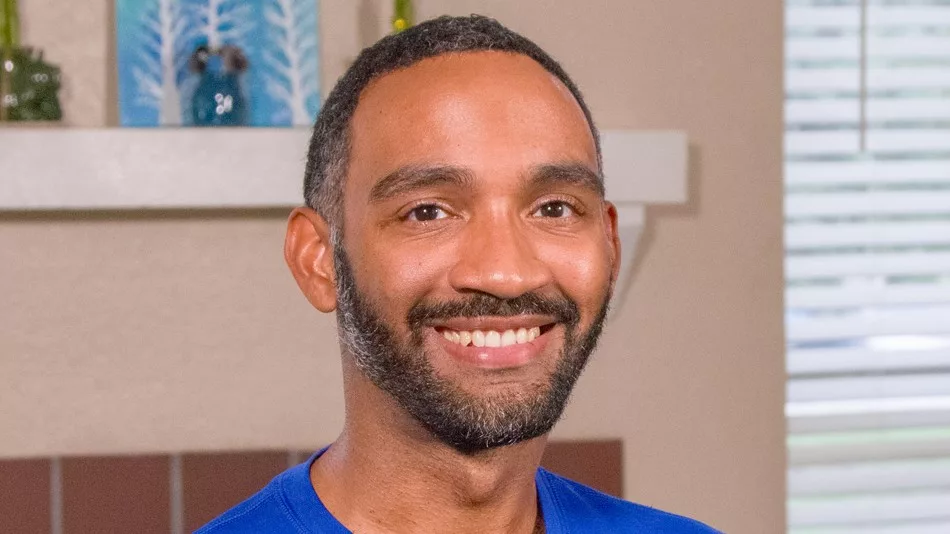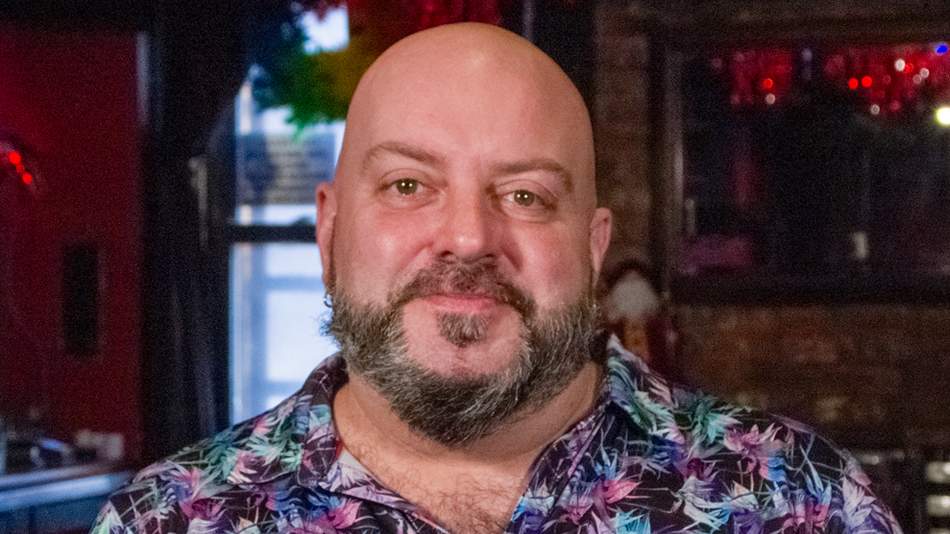I’m Tarik Daniels and I’m from Detroit, Michigan.
Around 12 years ago, maybe 11, back in Atlanta, I was in a long-term relationship and we went on a business trip in Miami. He worked for a corporation and he was like one of the top of his corporation, so they flew us to Miami, an all-paid resort.
One afternoon in Miami, I walked into the bathroom and he was in a bathroom and it was like blood everywhere. He refused to go to the hospital. You know, he was like, ‘I’m fine.” I’m like, “Clearly, you’re not fine.” But I made him make a promise to me that once we got back home in Atlanta, that he would go to the hospital, right?
And by the time we got back to Atlanta, I think that next morning, you know, I had told his mom that what had happened. He wasn’t necessarily out of the closet, but his mother knew about us. That next morning, we went to the hospital and that’s when everything changed. I think I had to go back to work. I was a manager at a Rite Aid and so his mama volunteered to take him so I met them up there actually.
And he was like, “Well, you know, the doctor says that I have cancer. I have lymphoma cancer.” He… he was like, “You know, I have more to tell you.”
And I was like, you know, “What?”
And he was like, you know, “I also tested positive for HIV.” Well, I think he might’ve even said “full-blown AIDS” at that time. I was real big on using condoms and things like that so… but I still didn’t know. I got tested that day. I, you know, I came back negative.
We go back to the house and he’s having to take chemo. I had to end up going into, you know, changing my work schedule where I can go and take him to chemo in the morning between me and his mom. Me and his mom didn’t really have the best relationship, but then other families started coming to the house, you know, to check in… check in on him and stuff like that.
And I think during that time, he expressed to them who I was as his partner, but they never even knew he was gay. And I remember one Sunday afternoon,, his aunt, his great aunt and his aunts coming over to the house and basically told me to my face, “You know, you did this to my nephew. The way you guys live is what happened to my nephew. This was a punishment to him, but what y’all doing in his house.”
So I was very kind of like pushed out in a lot of ways when his family came to visit. I remember the last time he was rushed to the hospital, and he was like, we were… I was laying by his, was sitting, sitting by his bedside And his mom, I think she had went outside. And, you know, and he was like, you know, “I want to come back home. I want to come back home with you tonight.” And he was like… he was like, begging me.
And I remember just telling him “You’re going to come home. You’re eventually going to come home.” You know, giving him some kind of reassurance. And that was the last conversation I had with him. His mom called me and said that he had passed away. So I didn’t, you know, the last words that I had with him was, you know, “I want to come home,” and it was nothing I can do about that.
You know, I did reach out to her like, well, you know, I wanted to be a part of it. And, you know, I was told that, you know, it was family business. I get to the funeral. And the first… all the pews are filled. There was no space for me. So I had to find a space like in the back of the church. And so that, that feeling stuck with me.
And when I got back to Atlanta, Of course, I couldn’t afford the place that we stayed in together. His mother had taken claim of all the items. I literally went one afternoon, went and got all my stuff and left everything. And I started crashing on one of my good friends’s couch. And that lasted for months because during that time I just fell into a deep depression. Really deep depression. I was drinking, going out, you know, having sex.
One night, I talked to the phone, I was on the phone, my mom and I kind of like told her everything. And she told me to come home. My sister was living in Austin and I had visited before all this happened. And I was like, well, I don’t want to go back to Detroit, but let me… I want to go somewhere new.
So I packed my car. And I drove that 12 hour, 13 hour ride to Austin and I moved in with my sister and my nephew. That kind of helped me get back to some idea of who I was. And so I, you know, started writing, started doing theater and started doing art and stuff like that, and was living a really good life in Austin.
I decided that, Hey, you haven’t been tested in a long time. I remember them coming in and they were like, “When the last time you were tested?” just after, you know, I took the test and they wanted to talk about my sexual, you know, the same stuff they talk about.
The doctor came in there and I knew it. I knew I was HIV positive. And that was the information that I got. I didn’t really feel no way. I kind of just got numb. I was like, this is… it was my fate. But a lot of me inside of me took me back to Atlanta, it took me back to the day that my partner found out that he was HIV+, it took me back to that bathroom when I saw the blood, it took me back to the funeral. And so I had all this poz-phobia in my own mind because of those experiences.
So I went on about my life. You know, I would feed back home, like, you know, so-and-so passed away. And I would just keep seeing like all these RIPs. So people saying they’d probably died of HIV, or “I know that they were doing meth.”
It was around 2019. Why is black 20 and 21 year olds, or, I don’t know anybody dying from HIV? Because I was on my medicine. And, you know, I’ve started to do more like self reflect and work in a community and I realized it was really stigma. So I decided that I wanted to be the visibility for our community. I wanted to be the voice for those who could live with HIV and thrive with HIV.
I knew that was going to take work. I knew that I was not there yet. I remember the first session that I had with my therapist when I finally found one and I told them, you know, “I want to come out about my status and I am terrified.” And we worked together for months. All of 2019, we worked together.
I started to do more spiritual practices. I started doing sage, calling all my ancestors. I called, you know, started lighting up incense. I started doing, you know, Aruba practices, different African practices. You know, I, you know, I called on my great grandmother. So with therapy and my altar and my ancestors guiding me, I felt like I was ready.
So I remember being invited to this documentary called Thrive that was given by a good friend of mine, he produced it, but it was with the Kind clinic, a sexual health clinic here in Austin, Texas. The film was beautiful. It talked about different nationalities living with HIV and thriving with HIV.
So after the film, they had a question and answer session. I don’t know exactly what I said, but I do remember saying that “as a person living with HIV” in front of everybody in the audience. And so that was my coming out. That was the first time I had ever said it in a public platform. And I was like, Hey, let me, let me keep going.
I decided to come out on my podcast and talk about it. And I remember titling the podcast, “Living with HIV.” And right now, it is the most listened episode I ever had. And my family didn’t know my mother, my close family, but like cousins and colleagues, so many people loved on me during that time. And they still do, you know, that was just in 2020, you know?
So this was just a year ago that I’ve been trying to use my voice. You know, this is the tenth year since my partner passed away. So, you know, telling this story 10 years from now and see how far I’ve come, you know, from the day in that bloody bathroom to being able to lead a peer support group for those living with HIV every week is a beautiful thing. And I feel I’m grateful and I also feel free and I just… there’s no better feeling than that.








Share